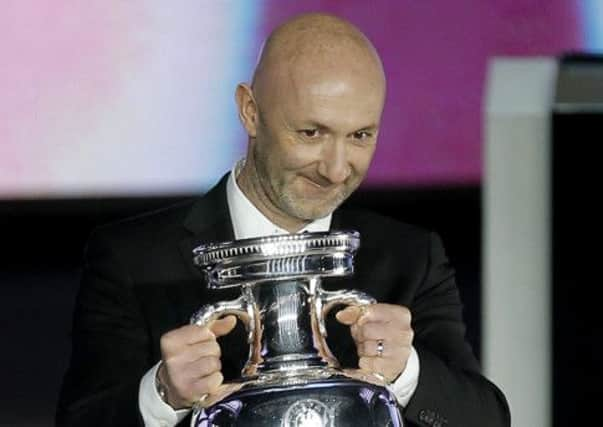Richard Sutcliffe: Platini’s inflated format produces formula for tedium


By the time UEFA and a host of famous goalkeepers had concluded proceedings in Nice shortly before noon, Three Lions fans were surely able to start planning for Paris, Marseille et al in a couple of summers.
A group where Switzerland, laughably ranked sixth in the world by FIFA when Belgium are 11th, are the second seeds and far superior to the other four combatants would have provided an easy passage to at least the play-offs even before the Euros took on the new bloated format championed by Michel Platini that will see 24 teams qualify rather than the 16 who competed at Euro 2012.
Advertisement
Hide AdAdvertisement
Hide AdBut now it is unthinkable for England not to progress, either as group winners or runners-up.
Even then, the new qualification process offers a third route via the play-offs for those teams finishing third.
Shocks such as when England were knocked out by Croatia at Wembley in 2007 will, under Platini’s ruinous brainwave, be conspicuous by their absence.
With 23 teams from a 53-team pool joining France in the finals, even the most mediocre of football’s erstwhile superpowers will surely not be able to mess it up.
Advertisement
Hide AdAdvertisement
Hide AdInstead of the crunch fixtures being, as was the case in qualifying for Euro 2012, Holland v Sweden, France v Bosnia or Denmark v Portugal, now it will all be about the battle for third place as Armenia host Serbia and Azerbaijan go head-to-head with Bulgaria.
And with UEFA committed to spreading all qualifiers across six days from the Thursday of an international break, the viewer at home can look forward to saturation coverage of the most boring qualification process in history.
Still, it is what it is, and England’s task will be to ensure there are no slip-ups in Group E.
In that respect, Estonia (ranked 91st by FIFA in their latest rankings), Lithuania (102nd) and San Marino (207th and joint worst) should result in a return of 18 points.
Advertisement
Hide AdAdvertisement
Hide AdNor should Slovenia, despite making England fight hard for a 1-0 win at the 2010 World Cup, prove too tricky an opponent after failing to qualify from arguably the weakest of the 2014 World Cup groups when finishing behind Switzerland and Iceland.
Which leaves the Swiss, who of course Roy Hodgson managed for four years in the Nineties and took to the 1994 World Cup finals.
A sixth-placed ranking from FIFA sounds like Switzerland could be tough opposition for an England side who sit 15th in the latest table. Scratch below the surface, however, and that standing starts to look, quite frankly, ridiculous. It is all down to the co-efficient points system that FIFA use to rate member nations.
Basically, three points are awarded for a win and these are then multiplied according to the following formula: World Cup games (x4), Confederation/Continental Cup/Euros (x3), Qualifiers (x2.5) and friendlies (x1).
Advertisement
Hide AdAdvertisement
Hide AdThe strength of the opposing team is then factored in along with the strength of each Confederation (Europe and South America rank highest) to give an overall score.
An easy qualifying group for the 2014 World Cup – when Switzerland remained unbeaten – is why Hodgson’s former team are ranked so high and England must be odds-on favourites to progress.